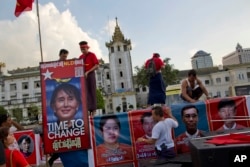Myanmar has been ruled for five decades by a reclusive military junta that handpicked a nominally civilian government in 2011. On Sunday, the Southeast Asian nation, formerly known as Burma, will vote in what is being touted by the government as a free and fair election.
We take a look at what it all means.
The system
At stake in the polls is control of the two-chamber legislature known as the Hluttaw. It is dominated by allies of President Thein Sein, a former military general who is part of a junta that gave up power to a semi-civilian government in 2011.
The parliament comprises the lower House of Representatives and the upper House of Nationalities. In both legislative chambers, 25 percent of the seats are reserved for the military as set in the constitution. They will appoint key ministers -- such as defense, home affairs and border affairs -- and also have veto power over any proposed constitutional change.
Following the national elections, representatives of the legislature will pick a president.
The election
Sunday's vote will be Myanmar’s first under civilian rule.
In May 1990, Myanmar held its first multi-party elections since 1960 when the military dictatorship took power. Aung San Suu Kyi had returned to her home country two years prior, to tend to her dying mother, but found herself caught up in mass demonstrations against the junta. The junta took notice and placed her under house arrest in 1989, cutting off any communication she might have with the outside world. In 1990, a parliamentary election was held, and the party Aung San Suu Kyi helped found, the National League for Democracy (NLD), won more than 80 percent of the parliamentary seats. The election results, though, were predictably ignored by the junta.
In 2011, the country ended the nearly half-century of military rule and gradually began to relax restrictions on opposition parties. It is hoped this election will be the freest in 25 years, but concerns remain about military influence and inaccurate voter lists. Also, the election commission has canceled voting in areas of the country embroiled in ethnic conflict, meaning the election will not be 100 percent inclusive.
The field
There are more than 6,000 candidates and 91 registered political parties vying for 498 seats for five-year terms.
But all eyes are on the two clear frontrunners. One is the ruling Union Solidarity and Development Party (USDP), which is backed by the military. The other is the NLD.
The military aligned party, the USDP, led by President Thein Sein, has campaigned on its record of running the government the last five years and a promise to guarantee stability.
Political observers in Myanmar say the NLD is expected to make huge gains after winning 43 out of the 44 parliamentary seats it contested in 2012 by-elections.
Aung San Suu Kyi's role
Despite her popularity and that of her party, Aung San Suu Kyi cannot be elected Myanmar's president. The junta, concerned that the Nobel Peace laureate's popularity could threaten its hold on power, introduced a new constitution in 2008 that effectively bars her from holding the highest offices in the country.
Article 59, believed to have been written with her in mind, says that anyone married to a foreign citizen or whose children are foreigners cannot become president or vice president. Aung San Suu Kyi was married to the British historian Michael Aris, who died in 1999. Her two sons are British citizens.
But Aung San Suu Kyi has said that if her party wins, she will run the government.








